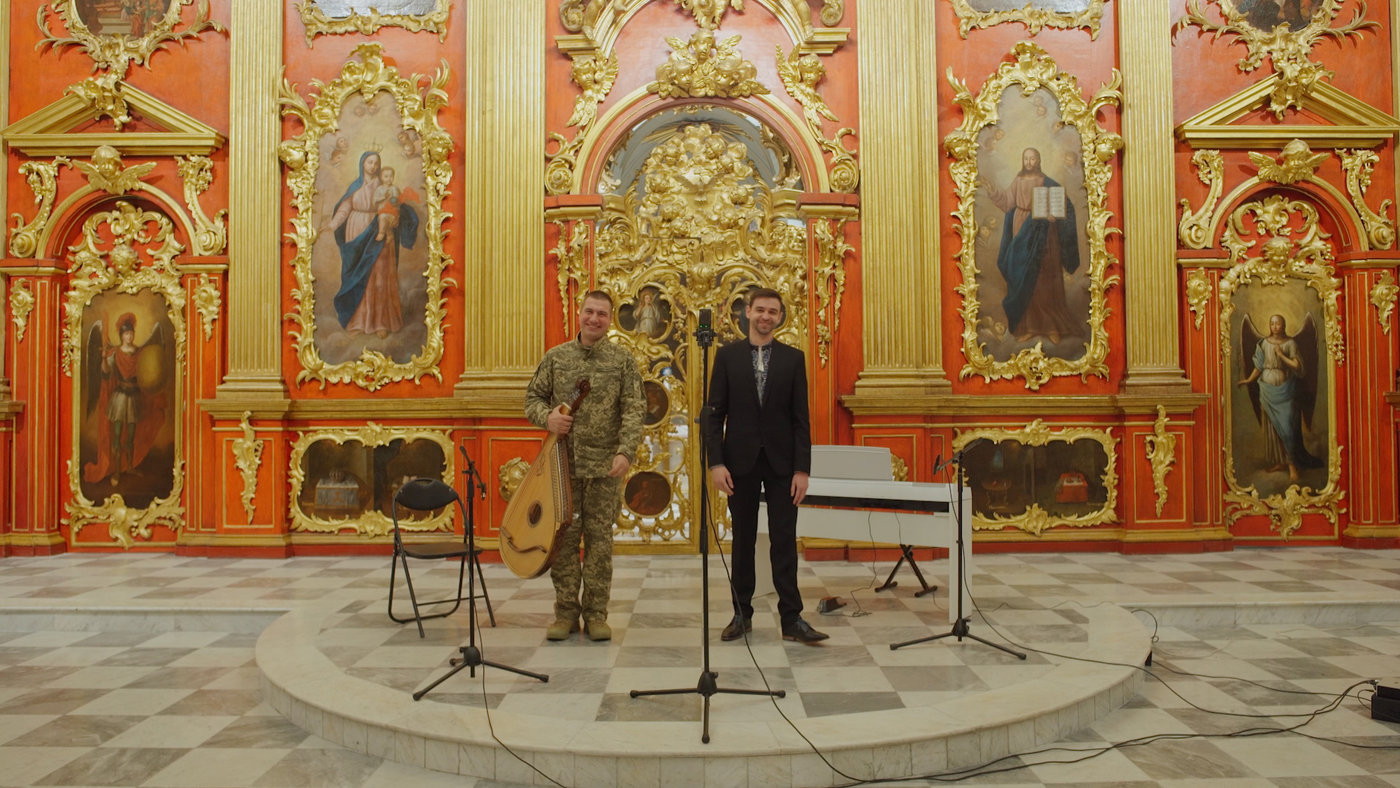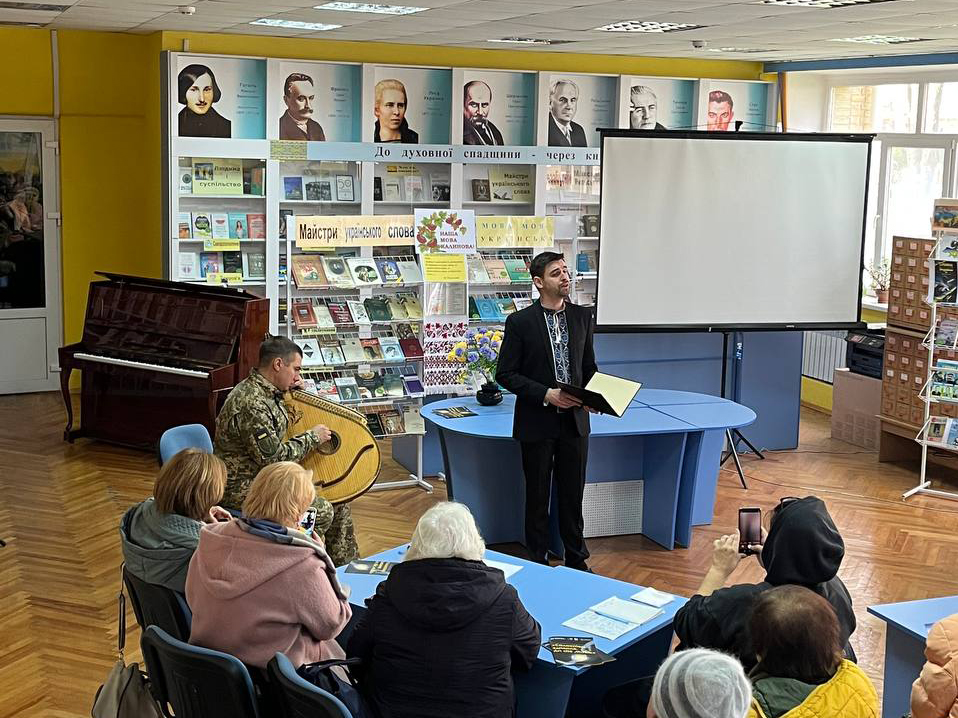Rapture into a better world - song recitals in Ukraine
With the help of Silke Gäng, Roman Melish organizes recitals in the Ukraine.

The gentle chords spread a sense of security. Roman Melish's bright, boyish voice is touching in its fragility. "You beautiful art, in how many gray hours," sings the Ukrainian countertenor. "You have enkindled my heart to warm love, you have transported me to a better world!" For this special song recital on November 25, 2022 in the gleaming golden St. Andrew's Church in Kyiv diesel generators are available so that the electric piano played by Andriy Vasin does not remain silent in the event of a power cut. Battery-powered lamps are also provided. Only in the event of a bomb alert would it have to be stopped. But it remains calm. The war refugees invited to the concert can dream themselves into a better world for an hour. A piece of normality in the chaos, a little balm for the soul.
Bandura player and soldier
Until a few days ago, Taras Stoliar was still fighting on the eastern front in the Donbas. Now the soldier in combat fatigues sits next to the singer and plays the bandura, the Ukrainian national instrument. This lute, which dates back to the 6th century, also sounds soothing with its delicate, silvery tones. In Soviet times, the bandura was bitterly fought against as a means of expressing Ukrainian national consciousness. In his posthumously published memoirs, Dmitri Shostakovich reports on a mass execution of bandura players in the 1930s.
Stoliar is actually a professional musician and plays in the Naoni Orchestrathe national orchestra for folk instruments. He has been defending his homeland since the Russian attack. He needed special permission from the military authorities for the concert. "We were able to show that musicians can also fight for our country as soldiers - and that soldiers can also be musicians," says Roman Melish in the video interview. The singer put together German and Ukrainian songs for this concert, which was also held on two previous evenings in a library in the former Russian-occupied Irpin. "The audience was very moved. I saw a lot of tears. For the duration of the concert, the audience forgot that they were refugees," he says.
Support from Basel
The fact that these recitals take place in the middle of the war is Silke Gäng to thank. The mezzo-soprano and artistic director of Song Basel studied together with Roman Melish in Basel. In recent years, when he lived in Kyiv again, he also came to Switzerland for concerts. "We were more colleagues than friends," says Gäng during a conversation in her hometown of Fribourg. When Russia attacked Ukraine and she saw terrible pictures from the war on Roman's Instagram profile, she was deeply moved and contacted him. "There were lots of solidarity concerts here at the time. I wanted to help the local people with music. But is music even needed when you're fighting for survival?"
At the Basel Song Festival, she and her fellow performers place the art song in a wider social context and explore the question of what music can achieve. The war was a reality check, so to speak. She collected donations in Basel for the ambitious project in Ukraine, worked on the program with Roman and spoke the German lyrics to him so that he could practice the correct pronunciation. She only found out through Roman's research that there was even a Ukrainian composer, Mykola Lysenko, who had studied with Carl Reinecke in Leipzig in the 19th century and introduced the German art song tradition to Ukraine.
Music to feel
For him, the art song was new territory. The countertenor specializes in early music. That's why he came to study at the Schola Cantorum Basiliensis in 2013. That's why he returned to Ukraine in 2019 to raise awareness of historical performance practice there. He has his singing to thank for the fact that he didn't have to take up arms himself. After the tenth day of the war, he received a draft notice. The soldier in charge at the military office recognized him as a singer, as he had appeared on Ukrainian television in the show The Voice a few days earlier with a Vivaldi aria - and sent him away again.
Roman experienced the outbreak of war on February 24, 2022 in his parents' house in the countryside in western Ukraine. "I was totally paralyzed and incredibly scared." He actually wanted to return to Kyiv the next day. Now there was panic everywhere. The cars were jammed. The supermarkets were empty. "My brother and I prepared our documents and packed a suitcase in case we had to flee." It was only on April 6 that he returned to Kyiv in a darkened train for a concert on Annunciation Day. And experienced a city in a state of emergency - with checkpoints, night-time curfews and people living in the subway because their homes had been bombed.
In the beginning, he felt completely useless as a musician during the war, but that has changed. "For me, music offers the opportunity to think about what is happening. I can share my emotions through music. People here need music because they want to feel something. It's important for inner stability." The war has changed him. He is more direct and less willing to compromise than before. Every day could be his last. But this awareness also makes him more sensitive to the fate of others.
When Silke Gäng contacted him, he felt "like a hug in this terrible war". The support from Basel means a lot to him. "It helps me so that I can help others. Our recital project has given me back my strength and energy. And has given my life a deep meaning again."
Melish now gives regular early music concerts in Kyiv again. For the next recital, he could imagine performing in front of soldiers. Or a concert in Butscha, the place that became known worldwide as a result of the Russian massacre. But first, Roman Melish is coming to Basel on April 21 to perform in the context of Song Basel to give a recital and thank the donors. In addition to Andriy Vasin and the soprano Ivanna Plish, Taras Soliar will also be there if he is granted special permission again. "Living dangerously" is the motto of the festival, which was decided long before the war began.









